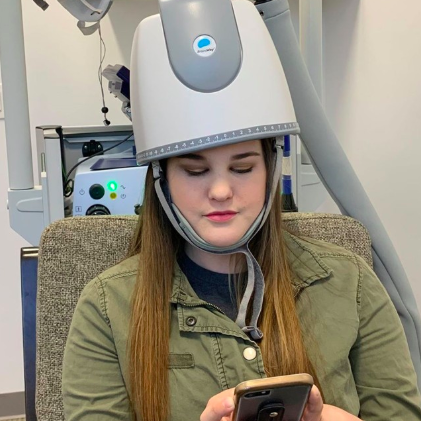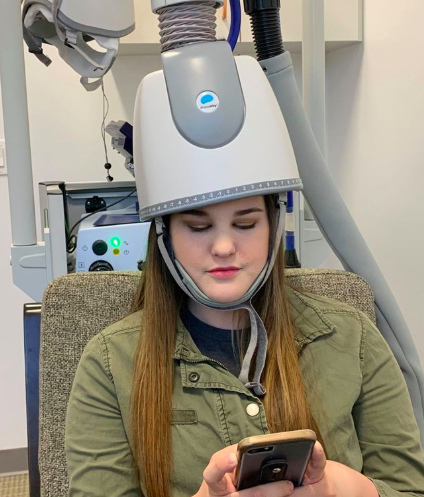
Transcranial magnetic stimulation, or TMS, is a non-invasive, medication-free form of brain stimulation used to treat depression, OCD, and an ever-growing list of conditions. A changing magnetic field is utilized to induce an electric current at a specific area of the brain via electromagnetic induction. An electric pulse generator, or stimulator, is connected to a magnetic coil connected to the scalp.
TMS Treatment
TMS and Depression
How TMS Works
Have you heard some of the captivating stories about the benefits of TMS therapy? One of our favorites was featured in The Atlantic. It’s about Bre Hushaw, someone who faced the brutal battle of depression head-on. Starting at just 15 years old, she spent five years navigating through a maze of emotions, trying 14 different medications in search of relief.
It was an incredibly challenging time, marked by moments of overwhelm and even escalating to self-harm at times. Bre’s journey included multiple hospital stays, and seemingly endless trials and frustrations, but then something incredible happened.
TMS Treatment
After a course of TMS treatment, it was as though a weight had been lifted from her shoulders – and indeed it had. Bre describes this transformative experience as nothing short of a lifesaver. What’s fascinating is that despite the life-changing impact, this treatment option remains relatively unknown to many. It’s a hidden gem that has the potential to make a world of difference, all without medication.
Imagine a world where innovative therapies like deep transcranial magnetic stimulation (TMS) are breaking boundaries not only for depression but also for OCD. Guess what? It’s here. The FDA has given its seal of approval for using deep TMS to tackle OCD. And that’s not all – the possibilities continue to expand even further. Researchers are delving into using TMS for addictions, as highlighted in a 2017 paper published in Nature Neuroscience Reviews. These exciting breakthroughs are not confined to the lab; esteemed institutions like Yale and Johns Hopkins are actively exploring and utilizing TMS.
In fact, the journal Neurology has also played host to a recent study that sheds more light on the potential of TMS. There’s a ray of hope when using TMS for patients dealing with PTSD. The journey of discovery continues, and the horizon continues to look brighter every day.
TMS And Depression – A Holistic Approach
A gentle reminder from the author of this captivating piece: let’s not forget the bigger picture. The way we approach depression and mental health creates an intriguing dynamic. It’s not just about fixing emotions; it’s about fostering a sense of security and self-worth. And while these cutting-edge treatments are remarkable, a holistic approach is the key. Think of it like this: just as you wouldn’t tackle diabetes with medication alone, mental health support thrives on a blend of lifestyle factors. That means embracing routines, nurturing a balanced diet, giving sleep the importance it deserves, staying physically active, nurturing social connections, and keeping our minds engaged and curious. These elements are the building blocks of our well-being, and they shouldn’t get lost in the shuffle, even when exploring advanced forms of care.
So, there you have it – a story of resilience, innovation, and the reminder that true well-being is a tapestry woven from multiple threads. Let’s celebrate the breakthroughs while never forgetting the power of holistic, well-balanced care. To learn more about how TMS can help you, contact us to schedule an appointment with our Milwaukee psychiatrist.
Author note: James Hamblin’s original article, “The Helmet That ‘Resets’ Your Brain” can be found here.

